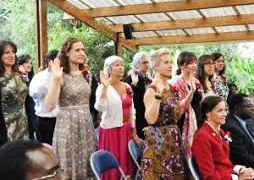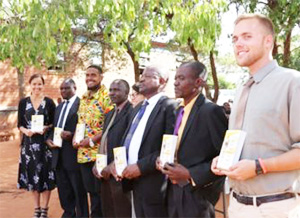Carol Spahn — Acting Peace Corps Director
Update January 22, 2021: Peace Corps reports that Carol Spahn has been appointed Acting Peace Corps Director by President Biden.
Editors note: Before her recent years with the Peace Corps in DC and Malawi, Carol Spahn was Executive Director of Accordia Global Health Foundation (Accordia) responsible for implementing new strategies and forging new partnerships to expand the impact of healthcare capacity building efforts in Africa undertaken by the organization. Carol previously served Accordia as its Director of Finance and Administration. Prior to joining Accordia, she was Vice-President, Chief Financial Officer and Treasurer of Small Enterprise Assistance Funds, a non-profit private equity fund manager that invests in small and medium-sized companies in developing countries. Carol was a PCV as a Small Business Advisor in Romania shortly after the fall of communism and has also held several positions with financial service institutions, including GE Capital and KPMG Peat Marwick. She holds an M.A. in International Development from the George Washington University Elliott School of International Affairs and was an undergraduate in Washington, D.C. at Catholic University.
Carol spent 5 years and 6 mos as CD in Malawi, and has been Chief of Africa Operations since December 2019.
When she was in Malawi as CD. she was interviewed in 2015 by The Nation publication. See the interview below.
•
Volunteerism Is Alive in Malawi
by Sam Chunga, The Nation
28/03/2015
Q: When Peace Corps was being set up in 1961 as a grassroots development organization to promote peace and friendship, many people, then, could have been forgiven for being pessimistic on whether its lofty goals could be achieved. Looking back several decades now, what is on the scorecard?
A: Peace Corps was established on the premise that the exchange of ideas and cultures—person to  person—can result in a better understanding among nations. Over 220 000 volunteers have served since the Peace Corps was established. I recently interviewed several leading Malawians and heard personal testimonies about how Peace Corps opened their minds about issues as diverse as the role of women to race relations, to international politics and development. I have also met volunteers who went on to serve in Congress and in other leadership capacities in the US or abroad. They talk about how their formative years in Peace Corps taught them more about the world than any classroom. Can we say that Peace Corps has promoted peace and friendship across nations? Absolutely!
person—can result in a better understanding among nations. Over 220 000 volunteers have served since the Peace Corps was established. I recently interviewed several leading Malawians and heard personal testimonies about how Peace Corps opened their minds about issues as diverse as the role of women to race relations, to international politics and development. I have also met volunteers who went on to serve in Congress and in other leadership capacities in the US or abroad. They talk about how their formative years in Peace Corps taught them more about the world than any classroom. Can we say that Peace Corps has promoted peace and friendship across nations? Absolutely!
Q: What motivates the volunteers to sacrifice comfort back home and face harsh conditions in order to serve poor people?
A: Peace Corps Volunteers are a special breed and they certainly do give up a lot, but they also gain a lot. They are looking to be a part of something that is bigger than they are. They hope to give back, to expand their understanding of the world, to experience a new culture, and to challenge themselves. What they gain are deep relationships, perspective, personal growth, and lifelong memories.
Q: Getting down to Malawi, in particular, what has been achieved and what have emerged as challenges?
A: Over 2 600 volunteers have served in Malawi since 1963, in the areas of education, environment, health and youth. One of the biggest challenges faced by our volunteers is that many NGOs come in and provide handouts, which can result in a culture of reliance on others. Our approach is different. We have three goals. The first is to build capacity and the last two are to promote cross-cultural understanding. Volunteers live and work side by side with colleagues in the community. We bring knowledge and energy, and we seek to gain deep understanding and to build trust. We believe in the power of relationships and ideas to get things done.
Q: When you meet top Malawi government officials, what are some of their testimonies on how Peace Corps continues to inspire Malawi’s development efforts?

Malawi Health PCVs being sworn in
A: I was fortunate to have the opportunity to interview several leading Malawians who were taught by Peace Corps Volunteers when they were in secondary school. What struck me from the interviews was that people remembered their volunteers’ names—often 40 or even 50 years later—and talked about how the volunteers inspired them to do things that seemed impossible at the time. One woman recalled thinking that if her volunteer could come to Malawi and give up a comfortable lifestyle in the US, then there was no limit to what she could do.
Q: At the grassroots level, how has the Peace Corps in Malawi improved social relations between Malawians and Americans?
A: During my first week in the office, an older American gentleman came in with an even older Malawian woman. It turns out he had been a volunteer 25 years ago and the woman was his amayi from the village where he did his training. She had hosted volunteers for more than 20 years and he had been back to Malawi three or four times since he first served the host community. Peace Corps Volunteers in Malawi fall in love with this country and it stays with them for the rest of their lives. Many stay in country following their service – and a few now call Malawi home.
Q: How is the globally-respected clarion call by US President John F. Kennedy—for people to offer voluntary services to communities, rather than expect such services only from their governments—still relevant today?
A: I find this question very interesting. In my travels around the country, I have seen tremendous examples of Malawians who have stepped up to volunteer, or to support, members of their communities in different ways. I think volunteerism is alive and well throughout Malawi.
Q: In this day and age of budget cutbacks, should Malawi expect to continue benefitting liberally from the many projects Peace Corps carry out?
A: Peace Corps is committed to Malawi and will continue to bring volunteers to support these projects.
Q: On a lighter note, have you gone on ‘excursions’ in remote areas in Malawi?
A: I have travelled to several remote villages throughout Malawi and have been welcomed with open arms by the volunteers and their communities. In Machinga, I met with a women’s group that had started not only honey production with the support of volunteers, but also a bakery, a fish pond and a tree nursery. The group had also planted over 15 000 trees! This was such an impressive and motivated group of strong women; and we had a fabulous visit.
Q: When did you start your tour of duty and how have you settled down to your work?

Carol (at left) with Malawi Educators
A: I arrived in Malawi in August last year and am thrilled to be here. Malawi is a wonderful place to live, we have a very committed team at Peace Corps Malawi, and our volunteers are doing incredibly inspiring work with their communities.
Q: Where else have you served under the US Peace Corps?
A: I served as a volunteer in Romania, after the fall of Communism, from 1994-1996. I was a small business development volunteer and worked with entrepreneurs who were looking to start businesses as the country transitioned into a market economy.
Q: When you ‘lose’ yourself in such remote villages, what is your favourite Malawian dish?
A: I think it has to be chambo with nsima!
Does peace corps help college students in Malawi?